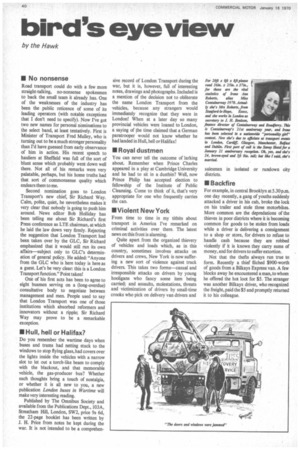bird's eye view
Page 42

If you've noticed an error in this article please click here to report it so we can fix it.
by the Hawk • No nonsense
Road transport could do with a few more straight-talking, no-nonsense spokesmen to back the small team it already has. One of the weaknesses of the industry has been the public reticence of some of its leading operators (with notable exceptions that I don't need to specify). Now I've got two new names for personal nominations to the select band, at least tentatively. First is Minister of Transport Fred Mulley, who is turning out to be a much stronger personality than I'd have guessed from early observance of him in action. His recent speech to hauliers at Sheffield was full of the sort of blunt sense which probably went down well there. Not all of his remarks were very palatable, perhaps, but his home truths had that sort of commonsense quality which endears them tome.
Second nomination goes to London Transport's new chief, Sir Richard Way. Calm, polite, quiet, he nevertheless makes it very clear that nobody is going to push him around. News editor Bob Holliday has been telling me about Sir Richard's first Press conference as LTE chairman, at which he laid the law down very firmly. Rejecting the suggestion that London Transport had been taken over by the GLC, Sir Richard emphasized that it would still run its own affairs—subject only to GLC's determination of general policy. He added: "Anyone from the GLC who is here today is here as a guest. Let's be very clean this is a London Transport function." Point taken!
One of his first acts has been to agree to eight busmen serving on a (long-overdue) consultative body to negotiate between management and men. People used to say that London Transport was one of those institutions which absorbed reformers and innovators without a ripple; Sir Richard Way may prove to be a remarkable exception.
• Hull, hell or Halifax?
Do you remember the wartime days when buses and trams had netting stuck to the windows to stop flying glass, had covers over the lights inside the vehicles with a narrow slot to let out a torch-like beam to comply with the blackout, and that memorable vehicle, the gas-producer bus? Whether such thoughts bring a touch of nostalgia, or whether it is all new to you, a new publication London buses in Wartime will make very interesting reading.
Published by The Omnibus Society and available from the Publications Dept., 103A, Streatham Hill, London, SW2, price 9s 6d, the 22-page booklet has been written by J. H. Price from notes he kept during the war. It is not intended to be a comprehen
sive record of London Transport during the war, but it is, however, full of interesting notes, drawings and photographs. Included is a mention of the decision not to obliterate the name London Transport from the vehicles, because any strangers would immediately recognize that they were in London! When at a later day so many provincial vehicles were loaned to London, a saying of the time claimed that a German paratrooper would not know whether he had landed in Hull, hell or Halifax!
• Royal dustmen
You can never tell the outcome of larking about. Remember when Prince Charles appeared in a play at Cambridge University and he had to sit in a dustbin? Well, now Prince Philip has accepted election to fellowship of the Institute of Public Cleansing. Come to think of it, that's very appropriate for one who frequently carries the can.
IlViolent New York
From time to time in my titbits about transport in America I've remarked on criminal activities over there The latest news on this front is alarming.
Quite apart from the organized thievery of vehicles and loads which, as in this country, sometimes involves attacks on drivers and crews, New York is now suffering a new sort of violence against truck drivers. This takes two forms—casual and irresponsible attacks on drivers by young hooligans who fancy some item being carried; and assaults, molestations, threats and victimization of drivers by small-time crooks who pick on delivery van drivers and salesmen in isolated or rundown city districts.
• Backfire
For example, in central Brooklyn at 5.30 p.m. one day recently, a gang of youths suddenly attacked a driver in his cab, broke the lock on his trailer and stole three motorbikes. More common are the depredations of the thieves in poor districts where it is becoming common for goods to be stolen from loads while a driver is delivering a consignment to a shop or store, for drivers to refuse to handle cash because they are robbed violently if it is known they carry sums of money, and for drivers to suffer extortion.
Not that the thefts always run true to form. Recently a thief filched $900-worth of goods from a Bilkays Express van. A few blocks away he encountered a man, to whom he offered the hot loot for $5. The stranger was another Bilkays driver, who recognized the freight, paid the $5 and promptly returned it to his colleague
































































































